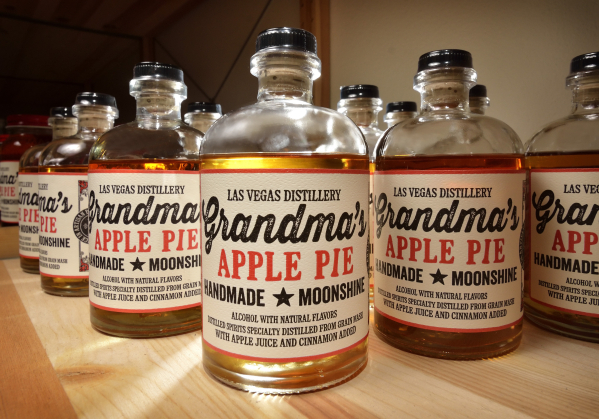What exactly is legal moonshine, anyway?
Jeremy Merritt knows exactly what moonshine is.
"Moonshine, to be moonshine, has to be illegally made, under the shine of the moon," Merritt said. "Produced primarily with a corn base, in the backwoods, in Appalachia. That's moonshine to me."
Merritt, craft spirits specialist at Wirtz Beverages Nevada, is an expert in this sort of thing, but that no doubt would be the definition of moonshine for most of us. Yet a scan of beverage-store shelves or a quick Internet search finds quite a few brands of seemingly oxymoronic legal moonshine. The website for Southern Living magazine even has a listing of the eight "best legal moonshines."
Moonshine has been around for a few hundred years, with references cropping up in the late 18th to early 19th centuries, when it was brought to Appalachia by Scottish-Irish immigrants. George Racz, owner of the Las Vegas Distillery, said it was particularly popular during Prohibition, which is of course logical.
"It was made very illegally," Racz said. "It was made at nighttime in the forest. The moon was shining above them and they were hiding."
Today, Racz is among distillers making it very legally; he said his Grandma's Apple Pie Moonshine is one of his top-selling spirits.
So what the heck is legal moonshine?
"Exactly the same kind of American spirit like bourbon," Racz said. "It's usually a rough spirit, because they didn't have time to refine it. You can't sit down and sip it with your friends for hours. It's not a cognac or a whiskey. It's not a fine spirit."
Well, let's back up a bit.
"There's a huge difference" between moonshine and bourbon, Racz said. While both are made with corn and sugar, bourbon is barrel-aged, which softens and develops its flavor and turns it a golden color. That's why, as Merritt pointed out, legal moonshine properly is called "white whiskey."
"You can attribute 70 percent of (whiskey's) flavor as coming from the wood," Merritt said.
"The difference is the barrel," Racz agreed. "It's moonshine before the barrel, whiskey after the barrel."
The moonshine Las Vegas Distillery produces is 100 proof, Racz said, which is a lot lower than the illegal stuff.
"Back in those times, it was 140 and sometimes they didn't even know the proof," he said.
And he points out that illegal moonshine production wasn't limited to the Appalachians.
"Besides gambling and prostitution, organized crime used it as a huge moneymaker," Racz said. "When you go to Boulder City, on the left side of the road are a couple of hills named Bootleg Canyon. That was the bootlegging place here in the Las Vegas Valley."
Issa Khoury, owner of Khoury's Fine Wine and Spirits on Eastern Avenue, said he may have six to 12 brands of moonshine on his shelves at a given time, depending on what's available from his supplier.
"Bourbon's kind of driving the growth right now," Khoury said. "I feel like moonshine kind of gets to ride that same wave a little bit. They're both corn-based whiskeys, so they're related in that matter. I feel like moonshine being neutral in flavor makes it good for mixing among a lot of mixologists."
Merritt said moonshine's popularity has tapered off.
"When it first came on the scene five years ago, it was really big in the craft culture here," he said. "You don't see it as much anymore." He said it's frequently used by bars producing barrel-aged cocktails.
So if it's rough, and has a basically neutral flavor, why do distillers produce it?
"A lot of distillers put out a white whiskey that's unaged because, particularly for new distillers, it takes many years" to produce a fine whiskey, Merritt said, because of the time spent aging in the barrel. "They're putting something out that they can make a profit on while they're waiting for their whiskey to age."
And a big part of the appeal, it seems, is the novelty value.
"It's a fun thing to have around when you're having a barbecue and everybody's having a laugh," Merritt said.
"I think it goes back to why is the mob so popular? It's kind of like breaking the law. You feel like an outlaw. It's something that has its own allure."
Contact Heidi Knapp Rinella at Hrinella@reviewjournal.com. Find more of her stories at www.reviewjournal.com, and follow @HKRinella on Twitter.




















